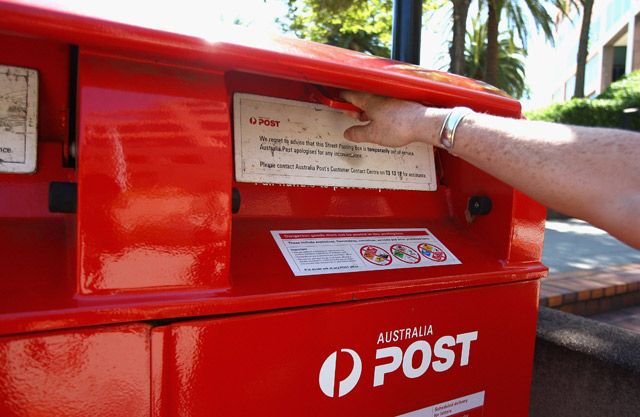
Postal e-Bulletin 2013 - #3
- EBA 8 summit
- Australia Post “becoming a parcels business” says CEO
- Australia Post boss says it's time to invest in broadband infrastructure
- CWU resolves dispute over shift time in FWC
- Scheme to change sick leave reporting a try on
- Australia Post decision poor form
- Royal Mail sale returns to top of political agenda
- International Women's Day – so much unfinished business
- Emergency services workers fight for fair EA
- Labor moves on 457 visas
1.EBA 8 summit
The CWU and Australia Post met on 1st March to discuss negotiation processes and timeframes prior to beginning formal enterprise bargaining negotiations. During the summit Australia Post boss Ahmed Fahour presented his view of Australia Post’s business position and his big picture and investment plans for the future. (See the story below which pretty much sets out AP’s position currently and for the future.) The 19th -21 st March has been set aside for the commencement of EBA negotiations.
2.Australia Post “becoming a parcels business” says CEO

The company is continuing a “Future Ready” transformation program in which it is streamlining mail operations and expanding parcel operations. “Delivering letters and operating more than 4,400 post offices in local towns across the country is still an important part of the community service that we provide, but there’s a whole other side to Australia Post, too,” he said. “We’re increasingly becoming a parcels business.” Losses in Australia Post’s traditional mail business, which have been mounting since 2009 and last year reached $190m, will continue to grow, Fahour said.
“It will continue to grow as our customers shift from physical to digital communications,” he said. “As a consequence there has been a reduction in staff in our mail division and like our falling profits this reduction is, unfortunately, likely to continue.” The Australia Post workforce stood at 33,031 in 2012, compared to 35,509 in 2009, with 1,000 job losses reported last year.
Fahour said his company was now thinking about its core markets in “completely new ways”, eyeing digital mail through the forthcoming new Australia Post Digital MailBox and e-commerce packages through a$2 billion investment in the parcel delivery network.
“If you’re thinking of equivalents in the physical world, this is effectively your letterbox, your filing cabinet and your payments card or bank account, seamlessly combined in a secure, online environment,” Fahour explained. E-commerce has become a billion-dollar business for Australia Post, with 70% of the company’s parcels now generated by Internet-based transactions according to its CEO.
Fahour said parcel volumes have been growing by about 10% each year over the past three years, fuelled by e-commerce, and that online spending in Australia is forecast to grow at double-digit rates through to 2020. Australia Post is investing “heavily” in capacity and technology for its parcels network, including 24-hourautomated parcel terminals to improve consumer access to e-commerce parcels, dubbed Smart Lockers. Some 50 locations now have Smart Lockers, with 200 more on the way in the next two years.
Fahour said small businesses in particular will benefit. “Not so long ago, our markets were really defined by geographic areas. Businesses would locate in an area where there was a population density that would provide the demand for the products or services that they sold. The rise of digital marketplaces supported by effective logistics networks has changed the nature of our marketplace entirely,” he said.
(Source: UNI Japan Postal News)
3.Australia Post boss says it's time to invest in broadband infrastructure
Australia Post boss Ahmed Fahour, the country's highest-paid government employee, has publicly expressed his frustration with the national broadband debate saying the discussion has been hijacked by the politicians. He says digital infrastructure is crucial for the country, and Australia Post, and it's time to move past the politics.
Plugging in to the digital world is crucial to Australia Post’s strategy of transformation from a mail delivery business to more of a parcel delivery business and little wonder Mr Fahour has expressed frustration with the country's focus on the political debate about the type of broadband network Australia should build.
While the needs of businesses like Australia Post are important in the debate also important is the type of service to be rolled out to the community, hence the CWU’s position that the new national broadband network should be a full fibre network so that the general public do not have to pay unreasonable costs for access.
(Source: ABC News)
4.CWU resolves dispute over shift time in FWC
CWU has recently taken several disputes to the Fair Work Commission arising from Post's actions in Mansfield and Underwood in Queensland. Several disciplinary matters will be challenged in the Commission once a Board of Reference appeal has been completed. However we did go back to the FWC a week ago when an injured member had his shift times altered without consultation, causing family problems. This followed an episode where the injured worker was further injured when given the task of "polishing wheel nuts on trucks". CEPU will not tolerate this type of treatment of injured workers and will take this further also. In the meantime Post has agreed to alter shift times too suit the worker.
5.Scheme to change sick leave reporting a try on
In the next week or so the CWU will be talking to members in Australia Post call centres about Australia Post’s latest scheme to reduce the cost of absenteeism in call centres by having employees report an unplanned absence i.e. sick leave or carers leave to a private company.
The proposed scheme requires workers to identify themselves, date of birth, workplace, reason for leave how long will be absent and suggestions to manage your illness etc!
Although proposed to be introduced under the guise of a health and wellbeing program, we believe that most workers would consider such a scheme generally to be about pressuring workers to return to work before they are ready, not to mention an invasion of their privacy. Such programs are costly and unnecessary as most workers are absent from work for genuine reasons, such as injury or illness.
No doubt if introduced in call centres it would eventually be rolled out elsewhere in other Australia Post workplaces. We would like to hear what call centre workers and other Postal workers think of the scheme so feel free to contact your CWU Branch or email cwu@cwu.org.au In the meantime the program is not consistent with the current reporting requirements in the EBA and will be strongly resisted by the CWU.
6.Australia Post decision poor form
What’s wrong with Tasmania? Why has Australia Post decided to axe its overnight delivery services in much of Tasmania? What impact will the decision have on postal worker jobs? How many other Tasmanian workers’ jobs will be affected? These are the questions the CWU and Tasmanians Greens MPs will be asking Australia Post.
Australia Post announced the decision last week - that as of April 8, it would be axing its overnight express service to most of the state, with the exception of the greater Hobart area.
Senator Peter Whish-Wilson has called for an urgent meeting with Australia Post following its decision.
"There are many small businesses that are reliant upon a reliable express postal service from Tasmania to the mainland," Senator Whish-Wilson said. "Without such a service, some firms will be placed at a competitive disadvantage to similar businesses operating from a region with guaranteed next-day delivery."
The general consensus seems to be that Australia Post’s decision is poor form.
7.Royal Mail sale returns to top of political agenda

It's only in the past few years that postal services have truly felt the pinch of the Internet. Revenues at the USPS, which delivers about 40% of the world's mail, peaked in 2007 at $75 billion. But the decline since then has been rapid. USPS revenue in 2012 fell to $65 billion, and its losses were $15.9 billion. It handled 160 billion pieces of mail that year, down from 212 billion in 2007. And it had slashed its workforce by 156,000, or 23%.
Elsewhere, the news is just as grim. La Poste in France estimates that by 2015, it will be delivering 30% fewer letters than it did in 2008. Japan last year delivered 13% fewer letters than it did 4 years earlier. In Denmark, the postal service said letter volumes dropped 12% in a single year.
The Universal Postal Union estimates that letter volumes worldwide dropped by nearly 4% in 2011 and at an even faster clip in developed nations. Developed countries closed 5% of their post offices in 2011 alone. And while Internet shopping continues to grow, postal services that once profited from their monopoly on letters find themselves competing for parcels against private companies like FedEx.
Donahoe said he thinks ending Saturday letter deliveries will keep the USPS a solid proposition for years to come. "People still go to their mailbox every day and they wait for their mail to come," he said. "It's part of American life." And it has been since the beginning. The postal service's role was defined in the Constitution, and Benjamin Franklin was the first postmaster general. The short-lived Pony Express achieved an enduring place in American folklore. Even the modern system of highways and airline travel grew from pioneering routes developed by the postal service.
"It's easy to forget how central this institution was to commerce, public life, social affairs," said Richard John, a Columbia University professor who has written a book on the postal service. "It was once very, very important. Of course, that was then and this is now." And for delivering a paper letter cheaply, there is simply no alternative. If rural residents were ever charged the actual cost of mail rather than the subsidized standard rate, John said, the costs would be prohibitive.
8.International Women's Day – so much unfinished business
International Women's Day celebrates the achievements of women, honours the struggles of those who fought to get us where we are today, and reminds us of what we still need to do to achieve equality.
Women still do not participate in the workforce in the same proportions as men, are paid less for doing the same work and continue to confront sexism and misogyny in the workplace.
But the issue which destroys or ruins the lives of so many around the world is violence against women. Human rights campaigner Bianca Jagger eloquently describes it as ‘a global pandemic of violence against women’. The details of what girls and women around the world are subjected to are horrific - from being raped by their teachers, to being jailed for adultery after rape, to constant beatings from supposed loved ones.
We know that alarming numbers of women experience violence, most often at the hands of a partner or other close relative. The 2005 Personal Safety Survey conducted by the Australian Bureau of Statistics revealed that 1,135,000 women, or 15 per cent of all women, had experienced violence at the hands of their previous partner and 16,100 had endured violence from their current partner.
The violence is now of such proportions that increasing numbers of companies are now providing up to 20 days' special leave and other entitlements for people who are dealing with domestic violence.
This is a welcome and pragmatic response and should be available to all women who are dealing with domestic violence, but it underlines the extent to which such violence is accepted as a 'normal' part of everyday life and that much more needs to be done to address the ongoing violence against women.
(Source: The Age ‘A global pandemic of violence against women’ Ann Summers)
9.Emergency services workers fight for fair EA
Emergency call service workers in Victoria have undertaken industrial action in pursuit of a new Enterprise Agreement.

ESTA workers from a number of unions, including the CWU, recently voted to approve industrial action in face of the Victorian Liberal government’s refusal to consider any pay rises above 2.5% for state government workers.
This policy has already provoked lengthy disputes with nurses and teachers in the state.
ESTA workers are also seeking recognition in their pay structures of the multi-skilling that is being required of them as a result of the range of areas ESTA covers.
Following the implementation of bans, the CFA and Metropolitan Fire Brigade have tried to get Fair Work Australia (FWA) to terminate the industrial action on the grounds that it was endangering public safety. To date, however, FWA has not been convinced of this argument and, with some modifications, bans remain in place while negotiations continue.
10.Labor moves on 457 visas
The federal Labor government has moved to tighten the rules on the use of 457 visas in the light of evidence of their abuse.
The visas are supposedly designed to allow employers to address short-term skill shortages without creating an underclass of underpaid and vulnerable “guest workers”. So in theory 457 visa workers are supposed to be paid at the same rates as local workers and enjoy the same conditions.
The practice, however, is different. Too often 457 workers are being underpaid or working in unsafe conditions. And they are less likely to complain about such issues than local workers because they depend on the employer for their visas and for the chance to get permanent residency in Australia.
Workers on 457 visas are also being used by employers to fill the gaps created by a lack of employer investment in training. This is the case in the telecommunications sector where, for instance, the NBN project is facing a shortage of network designers. The CWU understands that workers on 457 visas are being used by some contractors to meet this shortfall.
A variant of this pattern now appearing in both the telecommunications and finance sectors sees 457 visas being used by multinational companies to bring a workforce into Australia to be trained in functions a client (Telstra, a major bank) wishes to outsource. Once trained, the workers go back to home countries with lower wage structures and perform the work remotely.
This practice is a clear abuse of a scheme that it supposed to fill skill gaps, not facilitate skills transfer. Such abuses can only be tackled by stronger requirements for “market testing” by employers i.e. they must be able to demonstrate that there are no local workers available to do the job.










